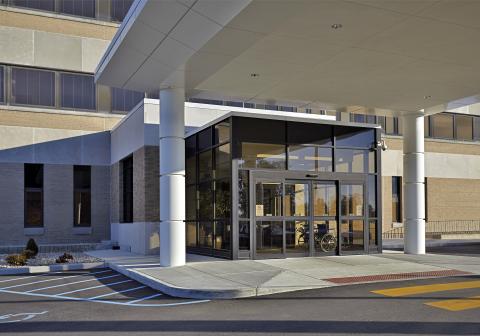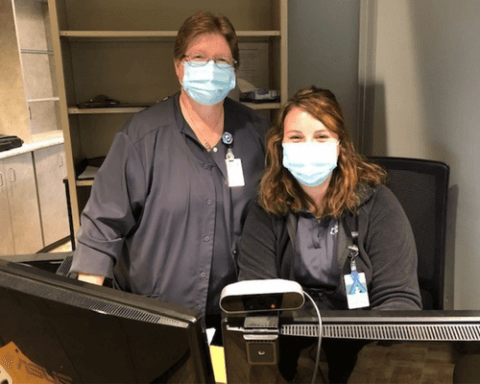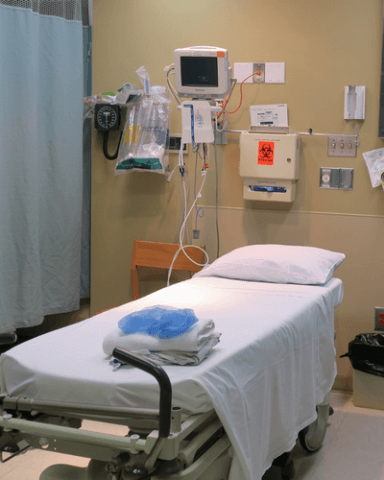When you need medical care, you want the best! That’s why you should choose Greene County General Hospital! We are one of two hospitals in Indiana awarded in 2023 with a Double 5-Star Rating by Centers for Medicare and Medicaid Services. At Greene County General Hospital, we care about your experience. Our nurses and staff […]
Greene County General Hospital
Our Family Caring for Yours
Surgery with SurgCare

If SurgCare patients require surgery, procedures are performed at Greene County General Hospital. SurgCare physician, Dr. Gabrielsen, works with GCGH’s highly skilled nurse anesthetists and surgical support staff to provide surgical procedures, close to home. Dr. Gabrielsen will determine if your surgery is outpatient or will require an overnight(s) stay. To schedule a consultation, or if you have any questions or concerns as a SurgCare patient, please call the SurgCare clinic at 812-847-3381.
This section will provide you information on:
- Scheduling your surgery
- Insurance prior authorizations for your surgery
- Anesthesia
- What to do the day of your surgery
- What to bring with you to the hospital
- What will happen the day of your surgery
- Information for family or friends waiting for you
Preparing for surgery
Preparing for a surgery can be intimidating. We are here to guide you from your first consultation with Dr. Gabrielsen, to the day of surgery and beyond. Once it has been determined that you will have surgery, SurgCare staff will schedule your surgery. They will discuss preparations you will need to make such as stopping certain medications and for how long, if necessary. Dr. Gabrielsen may also have you check with your primary care provider and/or your prescribing provider before stopping prescriptions prior to surgery.
Scheduling your surgery
You will be scheduled for surgery at the SurgCare clinic once it has been determined that you need surgery. Once your surgery has a date and they have discussed this information with you, SurgCare will send your surgery information to GCGH’s Surgery Department.
A Surgical Navigator from GCGH will contact you to preregister you as a surgery patient. This will save you time the day of your surgery. The Surgical Navigator will confirm your address, phone number, allergy information and talk to you about lab work that may be required before surgery. To connect with the Surgical Navigator, call 812-847-5214.
Pre-surgery evaluation
You may require a pre-surgery evaluation or surgical clearances that include a visit with your primary care provider or cardiologist and could possibly include having your blood drawn, an electrocardiogram (EKG), and/or having X-rays taken. Dr. Gabrielsen will look at your health history, medicines, and test results to make certain you are ready for anesthesia and to undergo surgery.
GCGH takes electrocardiogram (EKG) walk-ins. If you have orders for an EKG before your surgery, bring your orders to registration (main lobby or through the ER entrance) and we register you for an EKG.
Insurance
The Surgical Navigator will ask for your insurance information. If you do not have health insurance, please call our ClaimAid representative at 812-699-6067 to determine if you are able to obtain health insurance. You are considered to have health insurance coverage if you have Medicare Part A or C, Medicaid, CHIP, any coverage through your job, COBRA, TRICARE, VA health coverage, and some other kinds that may qualify.
The Surgical Navigator will confirm your health insurance coverage and, if needed, and GCGH’s Outpatient Navigation Department will work to secure a prior authorization, or sometimes called a precertification or prior approval from your insurance company. Advance approvals are usually required before a specific service such as surgery is delivered to the patient to qualify for payment coverage. To speak with a representative from the Outpatient Navigation Department call 812-699-6083.
Once your surgery is scheduled, you should contact your employer regarding your anticipated time off of work. Be sure to talk with Dr. Gabrielsen and his staff about the anticipated length of time you will need to take off. You will also need to drop off paperwork, such as Family Medical Leave Act (FMLA) forms, that need to be completed for your employer during SurgCare’s office hours: Monday-Friday 8:00 a.m. – 4:30 p.m.
Anesthesia
Pain control is essential to a successful surgical procedure. As always, patient safety and comfort are our priorities. Our comprehensive anesthesia care starts with a personal consultation with an experienced Certified Registered Nurse Anesthetists (CRNA) before surgical procedures and continues through recovery. A CRNA is a registered nurse who has specialized training in anesthesia. They will be administering your anesthesia for your procedure or surgery.
Types of Anesthesia
General anesthesia is common for many surgical procedures and is administered by injection or inhalation or a combination of both. Patients experience induction, usually through injection, which causes the sleep state. Anesthesia then continues through inhaled gasses and IV drugs.
Regional anesthesia is provided for a number of procedures. While patients remain conscious with regional anesthesia, there may be little memory of the procedure.
Local anesthesia numbs an area directly an is ideal for minor surgery and stitches. Spinal, Epidural, and Caudal anesthesia are administered through injection in the lower back and affect the lower extremities, as in childbirth.
Nerve blocks may also be given to numb a single nerve or a group of nerves.
Day Before Surgery
The Surgical Navigator will call you the day before your surgery to tell you what time you need to arrive, answer questions that you may have, and go over what to expect the day of your surgery. A CRNA may also call to review your medical history before your surgery. To connect with the Surgical Navigator, call 812-847-5214.
Planning Ahead
- If you are scheduled to go home on the same day as your surgery, you must have a responsible adult to drive you home following your procedure.
- We strongly suggest that a responsible adult be with you for the rest of the day and night following your procedure. This is for your protection and safety since you may not be as alert as usual.
- If you are being admitted to the hospital overnight or longer, be sure to bring items that you may need such as glasses, hearing aids, teeth, and cosmetics. You may also bring reading and writing materials, laptop computer, personal cell phone, and your device chargers.
- Be sure to bring a change of clothing to go home in.
Day of Surgery
No Food or Drink
You should not drink or eat any food, candy or chew gum after midnight on the day of your surgery. Dr. Gabrielsen or SurgCare staff should have informed you of any necessary medicines you will need to take the morning of surgery. These may be taken with sips of water only. You may brush your teeth on the day of surgery.
- Your surgery will take place at Greene County General Hospital.
-

Please register in the front lobby when you arrive Parking is available at the South (front) entrance and in front of the Emergency Department.
- Please register when you arrive at the front lobby (main entrance). GCGH’s Patient Access staff will go over your information once again to ensure that we have everything correct. Please remember to bring a copy of your insurance card and photo ID. You may be asked to pay any co-pays that apply to your health plan.
Be Sure To Bring:
- A list of Current Medication, Including Over-the-Counter Medication, Vitamins, and Herbal Supplements
- List of Allergies
- Identification (photo ID)
- Insurance Card
- Orders From Your Provider (if your provider has given them to you)
- Proof of Guardianship for Pediatric Patients
- Power of Attorney Information
- Advance Directives
- A List of Questions You Have About Your Surgery
Parking
Parking is available at the South (front) entrance and in front of the Emergency Department
Checking In
You will need to arrive at GCGH a few minutes prior to the scheduled procedure time and check in at the front lobby (main entrance). GCGH’s Patient Access staff will register you and confirm your information once again to ensure that we have everything correct.
If your surgery/procedure is an outpatient, staff will direct you to wait in the Surgical Services Family Lounge, located on the first floor near the main lobby. If your surgery requires you to stay overnight, you will be directed to the department that you will stay in after the surgery.
Preoperative Holding Area
From the Surgical Services Family Lounge, you will be brought back to your pre/post surgery room and asked to change into a hospital gown. Your belongings will be secured, or if you prefer, your belongings can stay with your support person. After being placed on a bed in your pre/post surgery room, your surgical care team and the CRNA assigned to you will introduce themselves and begin the pre-operation process. You will be asked several questions about your medical history, anesthesia history, surgical history, etc. Some of the questions will be asked several times by several different staff members. This is to ensure that we have all of your information correct and is necessary for your safety.
These questions may include:
- Do you have any allergies?
- What are we doing for you today?
- Which side are we operating on?
- Who is your surgeon?
- When was the last time you ate or drank?
The pre-operation team will obtain your vital signs such as height, weight, temperature, blood pressure, heart rate, and oxygen saturation. If your procedure requires an IV, this will be placed during the pre-operation process. Once the pre-operation nurse reviews all of your paperwork and has you checked in, you will be asked to sign a surgical consent. The CRNA will discuss the anesthesia plan and ask you to sign the anesthesia consent form. These are so that we know you understand what is happening and that you give permission for the surgery and anesthesia.
After you are checked in and consents are signed, your support person will be allowed to stay with you until the staff are ready to take you into the operating room. At this time, your support person will be asked to return to the Surgical Services Family Lounge.
During Surgery
Family or friends that are with you will be asked for a phone number so that our surgery staff can send them updates. They will either be updated by phone call or text, whichever they prefer. They are able to wait in Surgical Services Family Lounge or in their car while your surgery is taking place. The duration of your surgery is dependent on many factors. The surgery staff will work to keep everyone updated and informed about your status. If at any time during the surgery your support person has a question or concern, they may contact the Surgical Navigator from the phone in the lounge. The Surgical Navigator may be reached by dialing 2123 on the provided phone.
After Surgery
After surgery, the Surgical Navigator will bring your family or friends to talk with the surgeon in the consultation room. The surgeon will discuss how the surgery went, any important instructions, and what to expect after the surgery. Your family or friends will then return to the Surgical Services Family Lounge until you are ready for visitors.
Recovery Room

The recovery room is where you will receive care while recovering from anesthesia. this is in the same pre/post room that you were in prior to surgery. The time spent in recovery varies for each person and is based off of many factors. The minimum amount of time spent in recovery is 20 minutes. During this time, you will not be allowed visitors. Once you are recovered from anesthesia and vitals are back to baseline, you will move to the post-op phase, and we will start preparing you for discharge. At this time, we will allow your visitors to come back to your room and you will be offered a drink and/or snack. You might be asked to go on a walk so that we know you will be safe when you get home. In the post-op phase, you will be able to change back into your clothes from home. If you are going to be admitted after surgery, you will go through the recovery phase in the pre/post area and will return to your room after that you can expect to stay in the recovery room for a few hours. In order to give you the necessary care and privacy, visitation is limited in the recovery room.
Going Home
The main goal after surgery is to determine that you are safe to discharge home. When all of your needs are met and you are safe to go home, the nurse will print off your discharge instructions. Your nurse will go over these with you and your support person. It is common to forget what you were told because of the medicine you were given during surgery. Once all instructions have been explained, questions answered, and the discharge paperwork has been signed, you will be placed in a wheelchair and escorted out of the hospital by a staff member.
You should notify the SurgCare office if you notice any of the following 812-847-3381:
- A temperature grater than 101F
- Severe increase in pain
- Excessive drainage or redness of the incision
- Calf swelling and pain
- Chest pain



